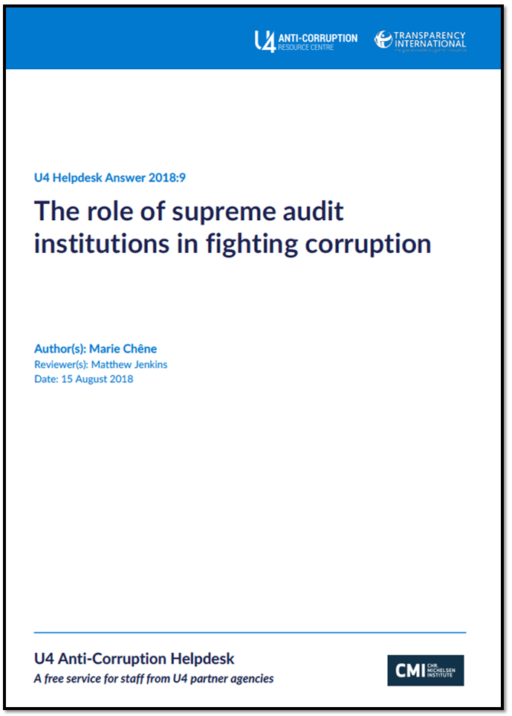
This Anti-Corruption Helpdesk brief was produced in response to a query from a U4 Partner Agency. The U4 Helpdesk is operated by Transparency International in collaboration with the U4 Anti-Corruption Resource Centre based at the Chr. Michelsen Institute.
Query
Could you provide an overview of the role and mandates of supreme audit institutions in combatting corruption? Are there general differences between countries historically influenced by Francophone systems and those influenced by Anglophones? Is there best practice for pro-actively involving audit institutions including supreme audit institutions (SAI) in the fight against corruption?
Purpose
Audit institutions are often overlooked when stakeholders consider preventing and addressing corruption.
Content
- The role of audit institutions in fighting corruption
- Best practice in involving audit institutions in anti-corruption work
- References
Caveat
This Helpdesk answer builds on a previous Helpdesk answer published in 2008 on the role of supreme audit institutions in combatting corruption.
Summary
While the mandate of supreme audit institutions (SAIs) is not tackling corruption per se, their remit to oversee government revenue and expenditure gives them an important role to play in deterring and detecting public sector corruption. In fact, the nature of SAIs’ work from verifying public accounts, assessing regulatory compliance and ensuring the highest standards of financial integrity means they are well positioned to contribute to anti-corruption efforts alongside other bodies, such as law enforcement or anti-corruption agencies.
While the evidence base is relatively thin, recent studies illustrate that where auditing is conducted professionally and independently of outside influences, the level of corruption can be reduced as public officials are less able to hide malfeasance behind financial misrepresentation.
There is a growing awareness of the potential of involving SAIs in the fight against corruption. Successful approaches include focusing audit planning on areas at high risk of corruption, cooperation and coordination with other anti-corruption bodies, and engaging civil society in audit processes. Training and capacity building activities are also important means of developing the anti-corruption expertise of public auditors as well as promoting knowledge sharing and cooperation between SAIs.
Authors
Marie Chêne, Transparency International, [email protected]
Reviewer
Matthew Jenkins, Transparency International, [email protected]
Date
05/11/2018

